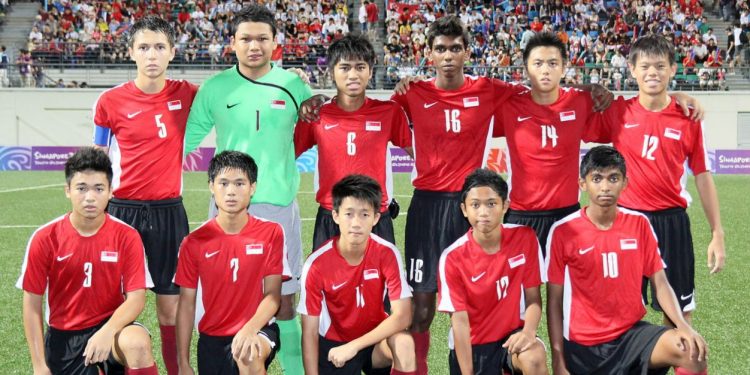Singapore football enjoyed a brief highlight in 2010 when the national Under-15 team were one of the success stories of the Youth Olympic Games (YOG) held on home soil. Their swashbuckling style of play captivated locals and ignited local football fever not seen for some time as images of full capacities at Jalan Besar Stadium and fans forming snaking queues for tickets filled the back pages of print newspapers and online.
Coached by 1994 Malaysia Cup hero Kadir Yahaya, the Cubs made light work of Zimbabwe and Montenegro in the group stage to advance into the semis. They bounced back from their last four defeat against Haiti to claim bronze after an emphatic second win over Montenegro in the playoff.
As a member of that medal-winning squad, Illyas Lee and his teammates found themselves feted by the public and the nation’s political leaders alike. They were seen as torchbearers for Singapore’s struggling professional football industry – new stars that would bring fans back to the stadiums. Now 11 years on, Lee is looking at carving out a professional executive career while working towards his degree at the National University of Singapore.
From 2012 to 2015, Football Association of Singapore (FAS) outfit LionsXII competed in the Malaysian professional league. The presence of a Singapore team after an absence of 17 years briefly reenacted the excitement of the 80s and 90s Malaysia Cup campaigns.
For three years, Syafiq Zainal was a utility forward for the now-defunct side, contributing to their 2013 Super League and 2015 FA Cup successes. Today, instead of terrorising opposing defences, he is rising through the corporate ranks at consulting firm Deloitte Singapore.
Crunching tackles was once part of Aloysius Yap’s game as he worked through the youth ranks at Balestier Khalsa and subsequently also featured in the middle of the park for Gombak United and Woodlands Wellington. These days, crunching numbers is his game in the banking industry.
Instead of building on the momentum generated by the YOG youngsters and the LionsXII, Singapore football went the other way. Not only have fans abandoned the local grounds in droves after the demise of LionsXII, players are also departing the local professional game at an earlier age.
Lee, Syafiq and Yap are among an increasing number of local footballers who are retiring prematurely, but not due to age, lack of talent or career-ending injuries. More notable names in this exodus include internationals Lionel Lewis, a two-time Asean Football Federation Championship winner, Faizal Abdul Hamid and Al-Qaasimy Rahman.
It seems playing professional football is no longer a viable career choice in Singapore, and the talent drain does not surprise Yakob Hashim, who served as an elected member of the FAS Council from 2017 to 2021.
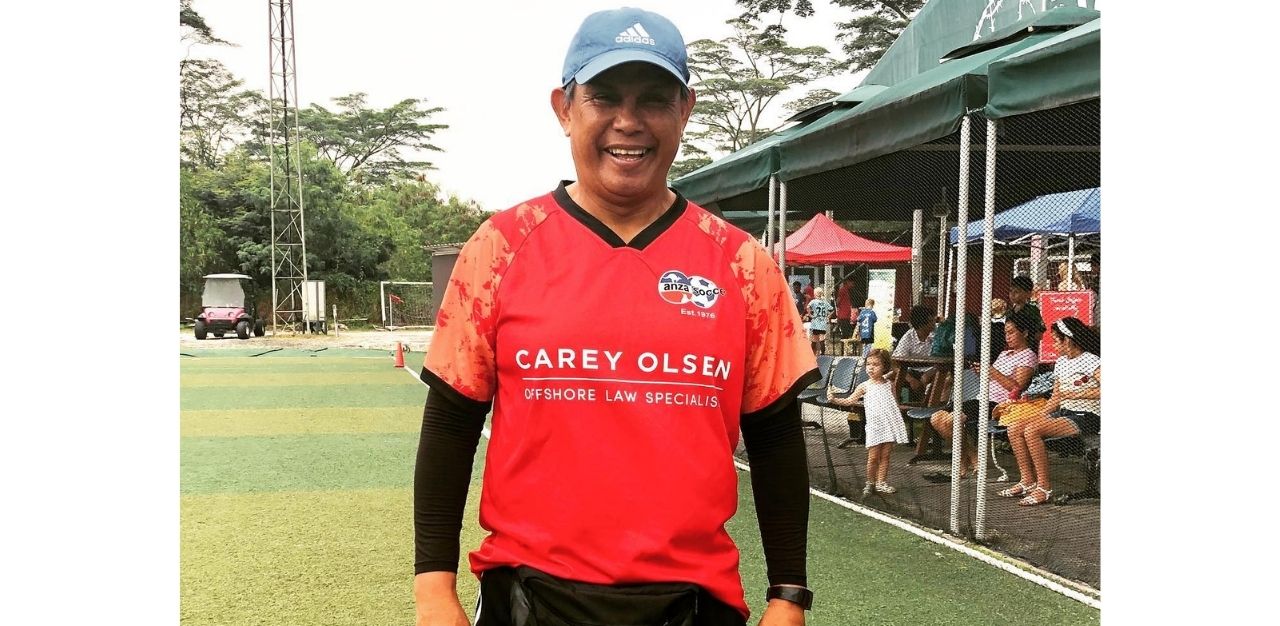
Pointing how the younger players are more street-smart in understanding the state of the game in Singapore, he feels seeing the plights of the older generations have opened their eyes on the perils of playing football without a fall-back to rely on.
“The younger players are more mature in the way they think. They realise that they cannot make a career out of football now,” says the 60-year-old football veteran. “They saw the sufferings of the previous generations. Back then, they quit when they were old and past their prime, but it was too late for them to find another job after retiring.
“Most young players realise that they have to start and move forward before it is too late for them [too].”
Smarter and savvier local footballers armed with diplomas
Before the mid-2000s, the typical route for a Singaporean footballer would be to head to the technical schools, which later evolved into the Institute of Technical Education (ITE), earn a living on the pitch before retiring when they were in their mid-30s or later.
The last generation to predominantly go through this path was the pool of players born in the early to mid-1980s, notably Baihakki Khaizan, Hassan Sunny, Shahril Ishak and Khairul Amri who are now veterans in the Singapore Premier League (SPL), the nation’s only professional sports league.
The budding player’s post-secondary education path gradually swung from the ITE to the polytechnics from the mid-2000s as the Republic and Nanyang Polytechnics pioneered the direct sports admission scheme, which was later extended to all the polytechnics. Now more local footballers playing in the SPL are armed with diplomas, having balanced their education and playing commitments at tertiary and club levels.
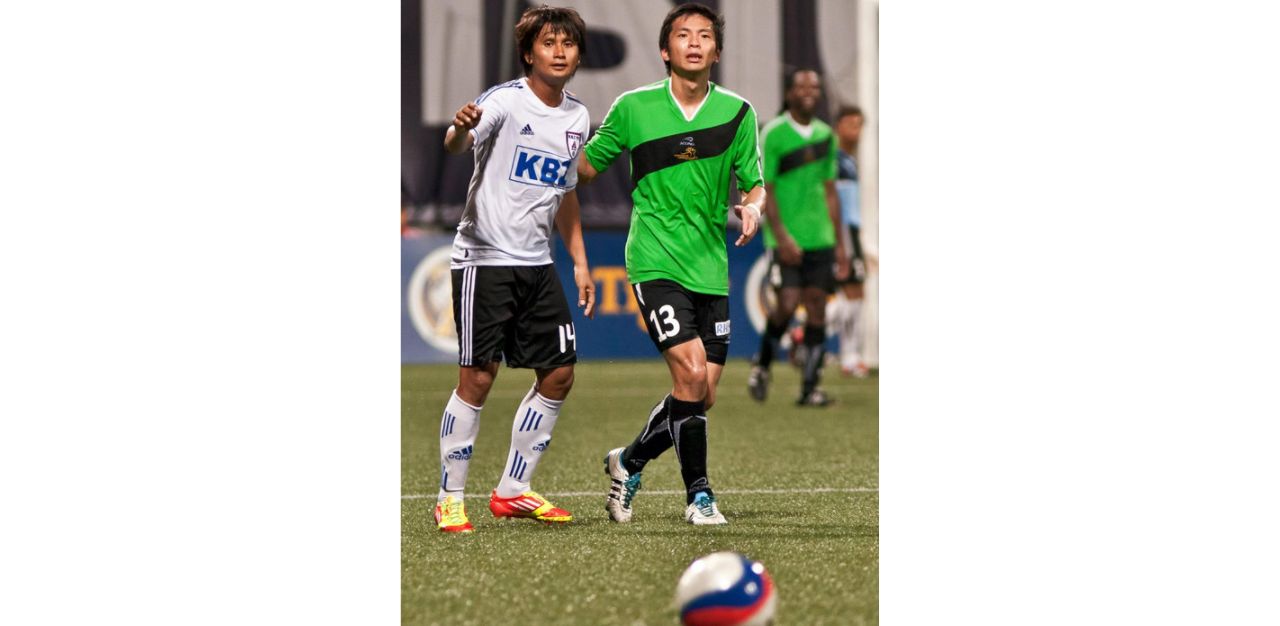
Noticing this upward shift in player education mobility was Yap, who estimates the number of active footballers having at least a polytechnic diploma has doubled in recent years.
“At the S.League (former name of the SPL) level during my time, if I have to put a number, it was probably 30 percent who were diploma holders,” says the 34-year-old former centre midfielder, who retired midway into the 2012 season due to work commitments after his university graduation.
“I will say that probably 50 to 60 percent of the current players have (at least) a diploma now, which is also the same if we take the average among the last few batches of the Under-23 Prime League (before its dissolution in 2018) players into account.”
According to Syafiq, during his years at the Singapore Sports School, different pathways existed for the student-athletes to take after their secondary school education. One of them is direct admission to Republic Polytechnic, bypassing the GCE O Levels examination.
Including himself, 10 of his football cohort of 22 enrolled into polytechnics after leaving the Sports School. He and Lee are also among an increasing group of footballers who enter such tertiary institutions on academic merit.
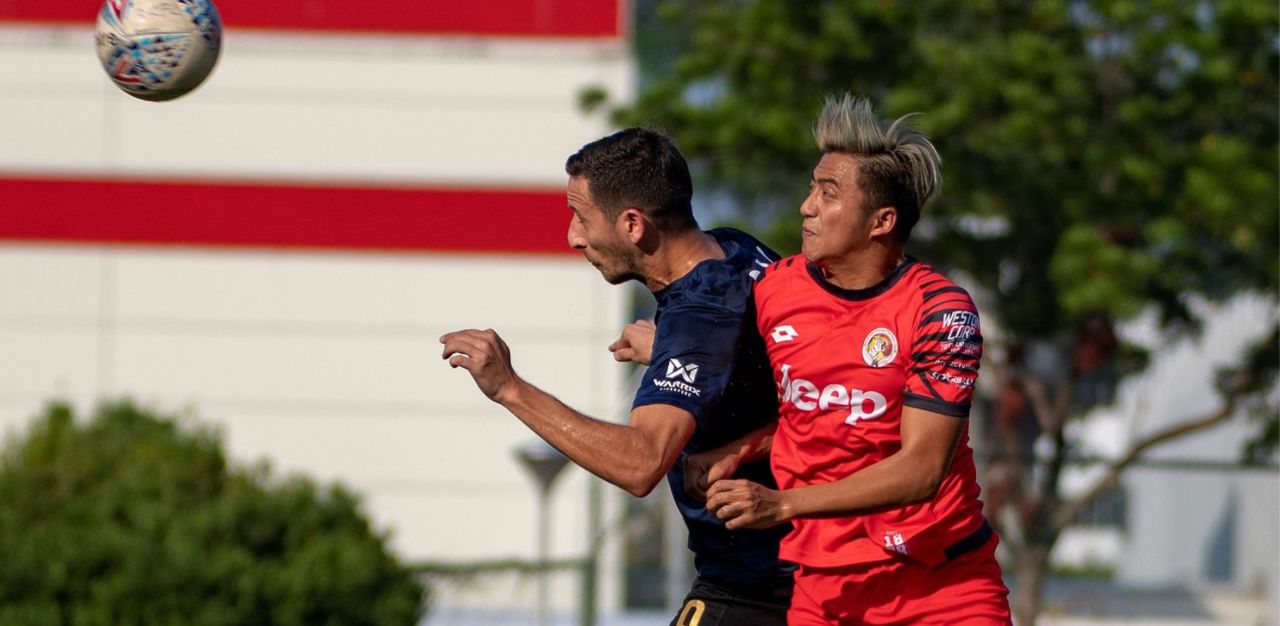
While the ITE curriculum helps students develop useful technical skills in various fields, the polytechnic education encourages them to take a broader horizon in the wider world through industrial attachments, internships and overseas outreach programmes in their diploma journeys.
Lee admits his time at Singapore Polytechnic had enriched him beyond the tutorial rooms and football pitch. “[Life at the] polytechnic taught me that I needed to be self-disciplined to manage both studies and sports,” he says.
“It also showed that there are a lot of possibilities to explore in terms of things that one can pursue. The academic curriculum gets tougher and there are many distractions which might hinder one’s growth, so it requires a lot of discipline to stay on top.”
Exposure to more worldviews impacts the mindsets of young people. Footballers are no different as increasingly fewer see playing professionally as a viable job in the medium to long-term.
“Many players told me, ‘Coach, I want to give [professional football] a try for two or three years.’” says Yakob. “They want to test water to see whether they can make [playing] football as a career.
“Since they are diploma holders and have seen the good and bad points of being a professional football player, they prefer job stability to playing as a career.
“You can see that many [professional local football] clubs are there just for participation and are not really interested in taking care of the welfare of the players. That is a big minus that makes the young players think twice.”
Insulting football salaries a major turn-off to awakened players
The dysfunctional local football system is a major reason preventing young footballers from venturing into a professional playing career in recent years.
Except for the privatised Lion City Sailors, SPL clubs are generally living from hand to mouth through the dwindling subsidies from Sports Singapore and Tote Board. Their charity status limits their ability to explore further means to generate more revenue, while ticket sales are negligible and fewer sponsors are coming forward.
This is a far cry from the early years of the S.League (the former name of SPL before 2018) when well-attended matches were the norm, the quality of play was decent and corporates were enthusiastic to associate the branding with the league.
The reduced funding impacts the salaries clubs can offer to prospective players for the next few seasons as almost all bar the Sailors rely on them for day-to-day operations and salaries for the playing, technical and administrative staff.
Yakob laments how the state of player welfare over the recent decades has now reached beyond the ridiculous, impacting the decision making of young players.
“They could make it a career before [in the early professional league years between 1996 and 2010]. During that time, the national team players were making around S$10,000 to S$15,000 a month with long-term contracts,” says the 60-year-old football coach.
“But now, if clubs are offering S$1,500 a month and some have part-timers getting more pay than the full-timers, it’s an eye opener for these youngsters [and their parents] to realise what is really happening.
“Such is the bad image the league is portraying that parents [and players] realise that a professional playing career won’t work. If you are telling me that a professional player is getting S$400 [a month] to play in the SPL because he is a student and is manipulated by the club, where are we going?”
Yap adds that such low salaries offered in the SPL rubs salt in the wounded dignity of young players, when other alternatives, including food delivery, provide better wages than kicking a ball.
“It is always a struggle for players, especially if you are a young prospect or just starting out,” he says. “Now some players do not even get that starting amount. I have heard some are even in the low hundreds, which is not even sustainable.”
Left stranded after contract expiry
Earning a decent wage is not the only struggle local footballers face when playing professionally, a durable contract remains a rarity despite a handful of clubs offering their playing staff two-year contracts.
For many players past and present in the league, clubs would typically hand out one-year contracts. Some were even given 10 to 11-month contracts from the less well-off clubs, or before the mid-2010s, six-month deals.
The perennial plight of such stranded players from the past and present generations leaves Yakob saddened on the clubs’ shoddy human resource treatment for the yeomen service they gave on the pitch.
“From the retired players who have already experienced it themselves, they posted on social media, [citing] what happened and how the clubs treated them,” he says.
“One year, they had contracts and were looking for an increment of 100 or 200 dollars for the next season’s contract renewal. Just for this little bit, they were just asked to leave the club.
“By the time they already got the local transfer certificates, it was too late for them to sign for a new club.”
It was this uncertainty over their playing futures that eventually forced Syafiq and Lee to stop playing professionally.
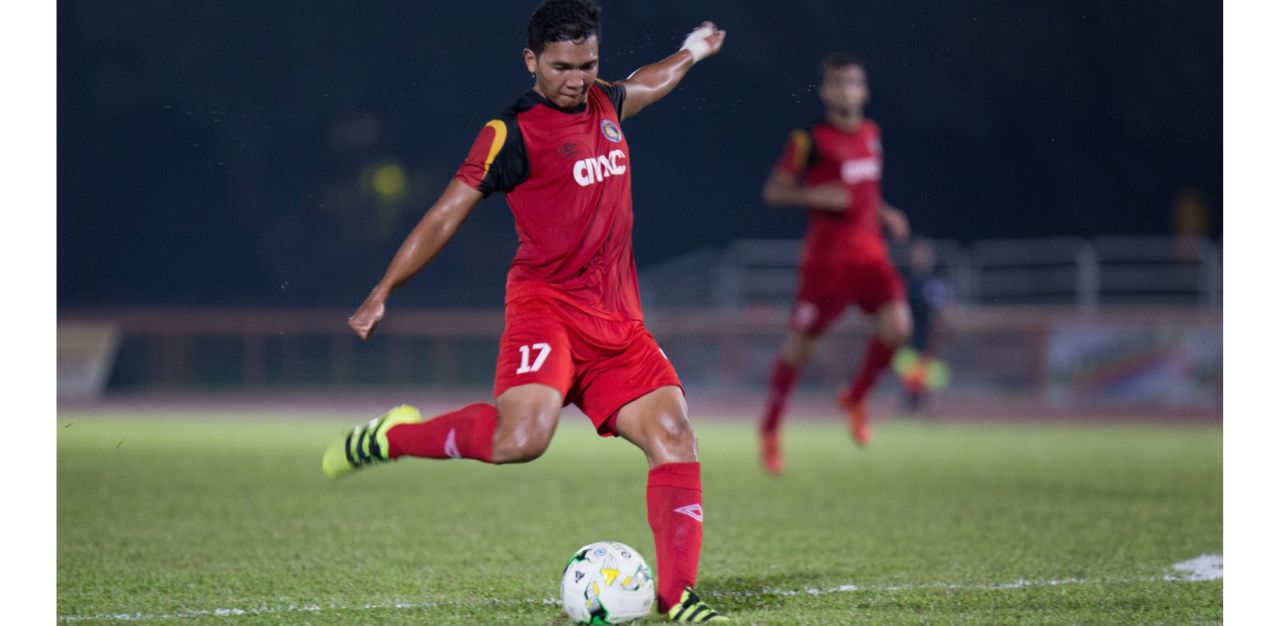
At the conclusion of the 2016 league season, Syafiq’s contract renewal talks with Balestier had stalled and there was a foreboding sense that things were not in his favour.
“I am not entirely surprised but at the same time, this thing is bound to happen,” said the 30-year-old retired forward. “Singapore football always has that edge of uncertainty sometimes, but as a professional, when you sign for a club, you complete it.
“Towards the end of that season, Balestier told me that whether they could renew my contract, they had to wait for next year’s budget from FAS and this and that. There was a lot of uncertainty.
“I was hoping that Balestier would provide a concrete offer, but they have already started signing a few players. I took these as signs that I should quit.
“[I see] no point going to other clubs because they would think my pay (Note: his Balestier salary in 2016 was split evenly between the club and FAS after the dissolution of LionsXII the previous year) is high.”
Lee was trialling with Warriors FC (previously known as Singapore Armed Forces FC) in early 2020 when word got around that the team would be sitting out due to financial woes.
“After being told late of my release from Balestier, Warriors was the only place left to go,” says the 25-year-old former defender.
“I was hoping they would overcome their financial issues so that I could play for them in 2020. It turned out that they had to sit out and it was too late to look for other clubs.”
Having not put pen to paper with the fallen former kingpins of local club football, he was left to his own devices. “There was some help from FAS, but they only managed to help out players from Warriors who had already signed,” he adds.
The exodus of young players over the toxic local football climate does not surprise Syafiq. He points out that despite the incentive of clubs to blood more footballers below the age of 23 into their first-team squads, the attrition rate has gone up instead.
“Young players retiring early now is quite ironic as the league has the age requirement [quotas for clubs to field Under-23 players in league matches], but they are retiring even earlier,” he says, citing policy frustration and fatigue in the fraternity.
“Till now, many players are wondering [what will happen to them] at the end of the season. The national team players and the better ones will probably have their contract talks earlier compared to the rest.
“With the announcement [of reducing the Under-23 starting quota from three to one] at the season, there is uncertainty in the direction.
“Every year, there are always changes here and there. Rumours have been circulating. Some players are tired and unhappy of such developments and frustrations.”
Football father mixed on sons’ retirements
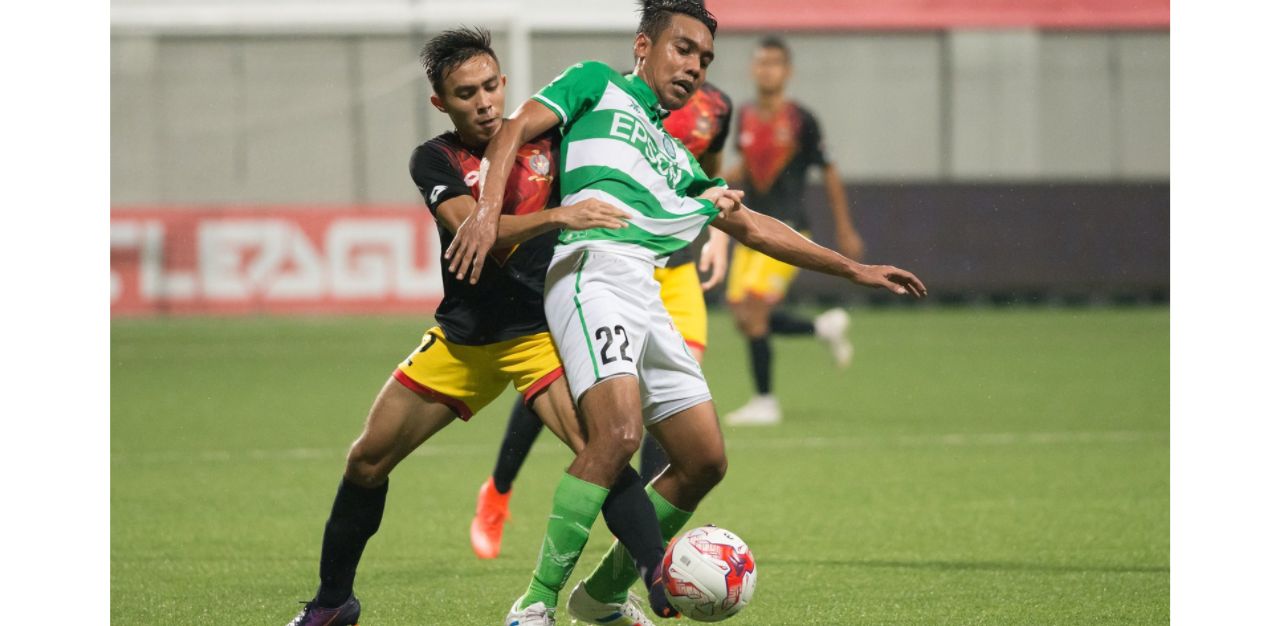
When he was a young father, Ghani Mahmood encouraged his three sons – Taufiq, Shahfiq and Fariq – to follow in his footsteps playing football. His passion rubbed off as all three subsequently earned contracts to play for local clubs professionally.
However, as the local football ecosystem deteriorated, his youngest son Fariq began to have second thoughts on seeking a career in professional football. A budding goalkeeper, he was best known for his penalty-saving heroics in the shootout to help the Tampines Rovers Prime League side lift the 2011 Singapore FA Cup.
Ghani explains how Fariq approached the dilemma, “Fariq told me before [when he was still playing], ‘Ba, I won’t play football for a long time. If I have a full-time job, I will quit football.’”
“During that time, he told me that he was applying for a job at the Immigration and Checkpoints Authority (ICA). Fearing that he might miss football, lose interest and become unhappy after taking up a new job, I told him to think it over for a few days.
“Days later, he told me, ‘Ba, I have made my decision. I will take the ICA job because I want to work and it’s a good government job.’” Thus Fariq became the first Ghani son to retire from active football for a more stable income in the civil service. He has been working at ICA since 2017.
While Fariq took the proactive approach to leave football for job stability, his elder sibling Taufiq only left the local professional football scene after failing to earn a contract following his release from Geylang International at the end of the 2017 season.
A journeyman player capable of playing in defence and defensive midfield, he had two separate spells with Geylang and also played for Hougang United and Woodlands in his seven-year professional career.
Ghani reveals his concerns when his eldest and youngest sons told him separately they wanted to leave the game they loved professionally.
“For footballers, they always say, ‘When I have a contract, I will play some more. I will quit once my contract expires or I am not offered a new one.’” he says. “Such decision-making is very simple, but as a father, I advised them to hold on to their decisions first.
“Towards the end of his second stint at Geylang, Taufiq told me, ‘If I have no contract, I [will] go and work outside.’”
Without a new club to go to, his eldest son eventually quit the game in 2018 to become a technician servicing and repairing photocopy machines, a position Taufiq still occupies today at the age of 31.
Ghani is most concerned about his decorated second son Shahfiq, who remains active in the professional football scene with Hougang. A Southeast Asian Games bronze medallist and Super League winner in 2013, the 30-year-old has struggled in recent years and has barely made half the number of league games for his present club this year.
In the second and final part, TheHomeGround Asia looks at how some footballers are getting a headstart on their post-playing careers while the local football fraternity continues to explore ways to help players prepare for life after football.
Join the conversations on TheHomeGround Asia’s Facebook and Instagram, and get the latest updates via Telegram.



